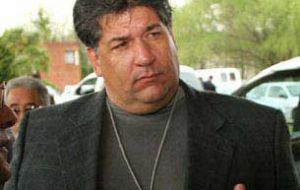MercoPress. South Atlantic News Agency
Cash-stuffed suitcase makes The New York Times headlines
 Argentinean public prosecutor asks for detention of Mr. Antonini
Argentinean public prosecutor asks for detention of Mr. Antonini The New York Times published Tuesday a long, critical article about the “cash-stuffed suitcase” which has the potential to “split Venezuela and Argentina” warm ties and left President Nestor Kirchner and his wife “scrambling to contain any potential damage to her bid to succeed him as president”.
The scandal involves a Venezuelan businessman who tried to sneak nearly 800.000 US dollars into Argentina where he arrived in a private jet together with officials from Argentina and Venezuelan oil companies. Credited to Alexei Barrionuevo, the article points out to the fact that even when President Kirchner's personal appeal remains un-eroded and Mrs. Kirchner "the most powerful first lady since Eva Duarte Perón, is well ahead of a fragmented field of opposing candidates, "the government's creditability has been nibbled away by a series of scandals in recent months". The latest involves Guido Antonini Wilson who arrived in Buenos Aires from Caracas with a suitcase stuffed with cash on a plane chartered by the Argentine government's national energy company. The plane also carried four executives from Venezuela's state oil company, Petróleos de Venezuela, and three Argentine government officials, Argentine newspapers have reported. The money source and for whom or what it was intended, is still under investigation. But within days, Mr. Kirchner dismissed Claudio Uberti, the Argentine official who had offered Mr. Antonini Wilson a seat on the plane. He also demanded answers from the government of President Hugo Chavez of Venezuela. "I am not covering up anything," Mr. Kirchner said at a public event last week, according to news reports. "My hands are clean", he insisted In a news conference late last week, María Luz Rivas Diez, the Argentine attorney general, said Mr. Antonini Wilson had made 12 trips to Argentina in the past year, some for less than a day. On Monday morning Mr. Kirchner's chief of staff, Alberto Fernández, joined calls for the Venezuelans to apologize for the incident, saying Argentina had "done everything that it needed to do." Under intense pressure to provide an explanation, Venezuela's state oil company, Petróleos de Venezuela, said Friday in a statement that it would investigate the mysterious trip. But on Sunday, Roberto Hernández, vice president of Venezuela's lower house, said President Chávez "doesn't have to say sorry" to anyone. Though Mr. Antonini Wilson had been traveling with employees of Venezuela's national oil company, the Venezuelan government insisted that the cash found on him was a personal matter. "The responsibilities are personal," said Pedro Carreño, Venezuela's justice minister, in comments broadcast Monday on Venezuelan radio. "If a personal object exists, it is a suitcase." The acrimony has doused the glow of the energy and debt accords struck between the two countries during a visit here last week by Mr. Chávez. Mr. Chávez agreed to refinance billions of dollars of Argentina's debt through a series of bond purchases. He and Mr. Kirchner also announced a natural gas deal that is expected to help soften a worsening energy crisis. "Chávez is a pebble in the shoe for Argentina's politics abroad," said Graciela Coatz-Romer, an Argentine political analyst. "But he is a necessity because he is a provider of funds, and for strategic reasons, because of Venezuela's role as a potential energy supplier." But the suitcase episode was only the latest scandal of recent months. Since March, Mr. Kirchner has had to contend with clear indications of corruption in a large gas pipeline project. One of the companies involved, the Swedish construction company Skanska, found evidence of what it described as "improper payments" by some of its executives, who have since been fired. News reports and an investigating judge have said the money appears to have gone to Argentine government officials. In June, fire inspectors making what was said to be a routine check of the offices of the new economy minister, Felisa Miceli, found 64.000 US dollars in local currency and dollars in her bathroom. At the same time, a judicial investigation is studying whether the Kirchner government has manipulated inflation data to cover up rising consumer prices, something it denies. The New York Times ends the article with irony: yet so far, the fragmented opposition has been unable to seize on the crises for much political gain. The hapless response has become the butt of jokes in local papers, with the Buenos Aires newspaper La Nación last week calling the suitcase incident "an impeccable opposition marketing operation that only lacked a candidate capable of taking advantage of it."




Top Comments
Disclaimer & comment rulesCommenting for this story is now closed.
If you have a Facebook account, become a fan and comment on our Facebook Page!